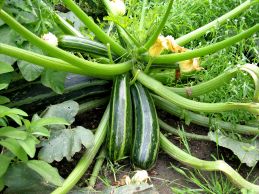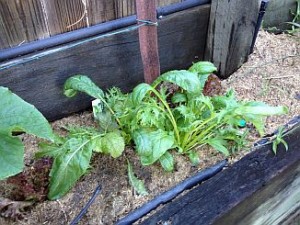Problems I’ve had in my garden this Summer
Short garden tour outlining some of my disappointments and challenges.
 Well here in Australia summer has just ended so we are just getting into autumn. And if I wasn’t busy sitting here working on my computer I would be out working in the garden getting it ready for winter!!
Well here in Australia summer has just ended so we are just getting into autumn. And if I wasn’t busy sitting here working on my computer I would be out working in the garden getting it ready for winter!!
Lol… Seriously, we have had a shocker with fruit fly this year. I have no doubt that the weather has been ‘perfect’ for them (that is usually the case here over summer), and apparently, according to the ‘powers that be’, they have banned a chemical that would normally be used to control their population growth.
Now, being the person that I am… I’m really glad they have banned that chemical (it must be pretty bad if they have actually banned it… and there are plenty more that should be relegated to the same fate… however… I digress), even if it does mean I didn’t really get any good fruit this year!
If that chemical being removed from the market has made such a difference, then it certainly highlights just how bad the fruit fly problem really is.
And I don’t think ‘chemicals’ are the answer anyway… at least not when it’s sprayed all over your tree and fruit.
There must be some other more eco-friendly solutions I figured… And so I bought baits and for the most part that helped but not enough to really improve my harvest.
Here is a short video giving you a tour of my little Urban Garden.
[leadplayer_vid id=”531EF49F6E256″]
Virtually all my lemons and tomatoes were ruined with fruit fly infestation, however, I didn’t use any physical barrier’s and clearly, this is something that I should have done.
There are a few other ideas I have to see if I can improve on the situation next year so thought I would share them here.
Dealing With Fruit Fly Naturally
- Use baits – either the commercial varieties or homemade ones, just remember if some of these have potentially harmful chemicals to dispose of them very thoughtfully.
- Use physical barriers – You can buy little net bags that you can put over your fruit or you can buy large netting to cover your whole tree. There are some issues here though… when you cover your whole tree you are also keeping out beneficial insects like bees and butterflies. Plus they can be a hazard to these insects or even to small birds if they happen to get caught up in the netting or inside and not be able to get out.
- Meticulous attention to garden hygiene – always pick up any fruit that has dropped to the ground. Fruit fly reproduce in the ground… the maggots crawl out of their ‘fruity cocoon’ and bury themselves in the ground to hatch into mature flies next season. So removing infected fruit from the trees and certainly picking them up from the ground as soon as possible it definitely critical in controlling these pests.
- Dispose of affected fruit by cutting open and putting into a bucket of water, and leave for a day or two – eventually, just strain off liquid and dispose of the fruit remains.
Some other things I want to try is improving the health of the soil… Along with compost, organic matter and mulching I want to try some bio-char and also rock mineral dust.
I believe the healthier the plants the less likely they will have pest and disease problems… Not sure how well this theory will work with something like fruit fly but there is certainly nothing to lose by experimenting with this idea some more.
The other thing is, I have just started studying Permaculture, and I am sure if I was in a position to be able to apply these principles, it would have to make a difference…. That won’t really happen totally here, however, it is certainly something that I will be applying to any future property, should we be able to move back to a more rural setting…
My other summer garden problem… Root Knot Nematode!
These are little pests… also called eel worm they cause growths on the roots of your plants that make the roots not function as they should and eventually it just causes the plants to wilt and die… Tomatoes and other plants are very susceptible.
This has definitely been another ‘developing’ problem which has become more noticeable over the past few years.
No doubt due to my ‘neglect’ of my garden… and a lack of ‘practicing what I preach’, however, that is just the way things are at the moment while I am looking after my Father and trying to work online at home.
There is never enough time in the day to get everything done, so some things suffer (well probably a lot of things to be honest).
Despite root-knot nematodes being a problem when they get out of hand, not all nematodes are bad, and providing you manage your garden well, then they should not be a big problem.
If you want to get a good run-down on these nasty nematodes then you can check out Jerry Coleby-Williams post over on Gardening Australia.
Ways to Attack a Nematode Problem:
- Resting the garden beds and rotating crops
- Solarising the beds – using a black plastic cover
- Planting a covering of marigolds and mustard greens and digging them into the soil
- Building up the health of the soil as mentioned earlier
So growing your own food can have it’s challenges, however, it is really worthwhile to learn how to deal with problems, and of course, ideally to learn how to avoid problems where possible. This is one reason I have decided to formally start a course in Permaculture Design. It is something I have skirted around for some years… I have mostly focused on chemical free and organic gardening, however, recently learning more about Permaculture, I can see why using this approach can not only save a person a ton of unnecessary work, but it is way more eco-friendly, and has a good chance of having less issues with bugs and diseases.
I will keep you posted with my progress with the course, and also you can expect me to be sharing more about Permaculture systems from here on.
As for my garden challenges this year, if you happen to be experiencing similar problems then I encourage you to consider some of the solutions and points I’ve mentioned.
Also, please comment below if you have some of your own suggestions or experiences to share… I would love to hear about them…
Happy Gardening 🙂
 I guess it is no surprise that we have reached this point where so many foods on our supermarket shelves are just getting worse and worse. Almost all of them should have a label saying ‘Unfit for Human (or animal) Consumption’!
I guess it is no surprise that we have reached this point where so many foods on our supermarket shelves are just getting worse and worse. Almost all of them should have a label saying ‘Unfit for Human (or animal) Consumption’! You’re probably already somewhat familiar with the concept of organic gardening. Organic farms and gardens forego the use of all chemical fertilizers and pesticides, instead relying upon natural techniques to control destructive pests. These techniques generally include composting, crop rotation, and using other plants and insects to control the harmful ones. The philosophy of biodynamic gardening goes even further.
You’re probably already somewhat familiar with the concept of organic gardening. Organic farms and gardens forego the use of all chemical fertilizers and pesticides, instead relying upon natural techniques to control destructive pests. These techniques generally include composting, crop rotation, and using other plants and insects to control the harmful ones. The philosophy of biodynamic gardening goes even further. The reasons you might decide to try growing your own might depend on the cost of certain items from the store. As you are no doubt aware, some veggies and fruits are more expensive, so you might figure you can save a bit of extra cash, if you decide to grow the more expensive produce, and just purchase the less costly items.
The reasons you might decide to try growing your own might depend on the cost of certain items from the store. As you are no doubt aware, some veggies and fruits are more expensive, so you might figure you can save a bit of extra cash, if you decide to grow the more expensive produce, and just purchase the less costly items. Sometimes it comes from a rise in food prices, other times it is the result of reduced circumstances. It can even come from a desire to improve the quality of the food you eat. Whatever the reason, many people each year
Sometimes it comes from a rise in food prices, other times it is the result of reduced circumstances. It can even come from a desire to improve the quality of the food you eat. Whatever the reason, many people each year 